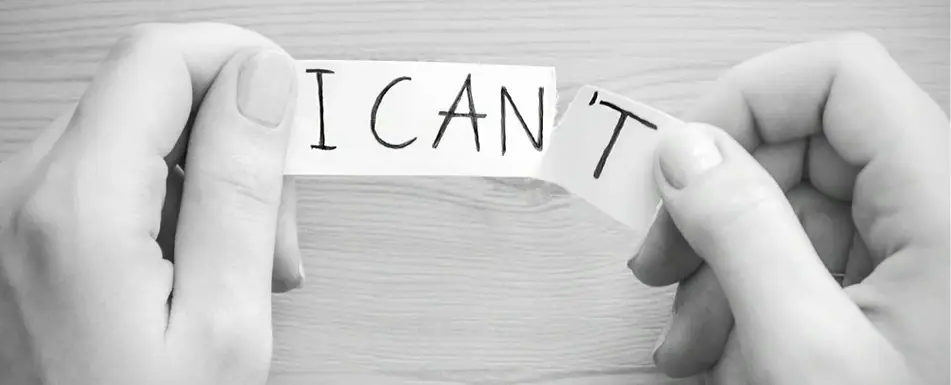Tame Your Inner Critic with These 4 Tips

It’s the voice that tells you not even to bother applying for that position because you’d never get it with your skill set. It paralyzes you when you’re creating a presentation, and it will never let you forget that stupid thing you said at an important meeting. Self-criticism is like a drunken heckler at a comedy club, and it could be stifling your ability to thrive. But there are ways to tame the demon, and even befriend it.
Psychologists point out that the human mind is much more likely to remember negative information than neutral or positive, and this tendency informs our actions. This focus on the negative sometimes results in the cultivation of an inner heckler that will be sure to exaggerate the dangers of any planned course of action.
When I started doing stand-up comedy a few years ago, I had no idea that it was going to involve anything more than memorizing jokes and reciting them. Trying to get a room full of potentially hostile strangers on your side is actually a bit more complicated, especially when some of them are emboldened by alcohol. Seasoned performers have a great way of dealing with unwanted comments: They embrace it and make it part of the act.
The intrusive voice of the heckler is certainly jarring, but it doesn’t have to ruin your show. Noticing when your morale is flagging and turning it into a motivation to stay grounded can turn the tide.
Make use of the negativity
Forget everything you’ve heard about forcing yourself to stay positive. Even your most negative thoughts, the ones you’d most like to ignore, can be useful. Negative thoughts aren’t the problem here. The problem is how you relate to them. The fear of blowing an interview can motivate you to prepare better if you can avoid the pitfall of letting it make you feel like a certain kind of person, like a “person who always blows interviews.”
Focus on the behavior, and not the illusion of a solid, unchanging you. A heckler just wants attention. If you can understand where that’s coming from, it’s a step towards transforming the situation.
Don’t identify with it
Self-criticism is not inherently correct just because it came from your own mind. If you believe your thoughts are always objective depictions of reality, your self-criticism will seem very accurate. Cultivating a sense of curious and creative detachment from your inner heckler can allow you to untether yourself from its grasp.
When you catch yourself in the midst of tearing apart your own plans, take a breath. Ask yourself an open-ended question about where these thoughts are coming from. Address the fears related to your anxiety. It’s scary! But only you can give yourself the space and permission to do it.
Respond, don’t react
Reacting is what you do out of habit. Responding skillfully is an art that takes awareness and effort. But like anything that takes practice, it can be mastered. When you learn not to identify with thoughts, it’s easier to respond to them rather than react. Once you’ve noticed the thoughts and examined them, you can choose how to respond to them, rather than defaulting to obeying what could be an exaggeration of potential outcomes.
It’s easy to go through a work day entirely on autopilot, simply reacting to anything that comes up. Exercising some choice in how you respond to incoming requests and turbulent situations in your workplace is a way to begin active engagement with your heckler.
Have a little perspective
When we say someone has a “good sense of humor” about something, we often mean that they are able to zoom out and see the bigger picture. Things are more likely to roll off our back when you are able to take the long view. Applying this to self-criticism can radically change your relationship to our little inner heckler. You might even have fun being experimental and trying different approaches rather than just hopping straight into the rabbit hole of self-defeat.
When you notice that you’ve gotten caught up in that same closed loop of negative thoughts, make an intention to zoom out and see the absurdity of the situation. You’ll notice some recurring patterns, and you can learn to laugh at yourself.
I’ve been doing stand-up comedy on and off for about five years, and there is just no way to ensure that someone won’t interrupt the show. Rather than letting this dictate how I create my material, I’ve decided to accept that whether or not I like it, heckling happens. It means the audience is alive (and honestly probably a little drunk). So, it’s a good thing that you have thoughts. Taking the perspective that even the most negative internal monologues can teach you something is a great way to learn about how you interact with others and how you treat yourself.
With a little space, some curiosity and a resolve to soften towards yourself, you can at least transform that voice into the kind of heckler you can laugh with.
Did you enjoy this post? There's plenty more where this came from! Subscribe here for updates.
About the Author | Caroline Contillo teaches mindfulness meditation at non-profits and community centers in NYC. Previously, she worked at Businessweek Online and The Interdependence Project, a secular Buddhist meditation center.

